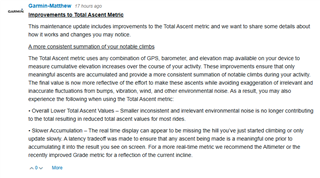Interesting changes to Garmin's native Grade and Ascent metrics....
I've developed a Grade Field that many prefer to the native grade, which is (or was), noisy and often showing irrational values. I found that quick acceleration/deceleration can cause the native grade to spike even on a flat road, the sampling rate of the barometer causes elevation data to be more of a step function, restarting from autopause or a stop can cause a huge change in reported elevation, etc.
It looks like they may have improved their Grade metric (probably using some of my techniques). But it also looks like they have moved the tradeoff point to introduce significantly more latency in the total ascent metric. My data field should remain unaffected, since I use altitude (really it should be called elevation) in my algorithm. But I'm curious if anyone has compared the two ActiviyInfo metrics: (altitude vs ambientPressure) to derive a near real-time elevation that has less noise. For point to point changes in elevation over just a few seconds, weather induced barometric drift doesn't really come into play, so I can't imagine a scenario where vertical GPS is better than a barometer (unless the barometer isn't available or is broken/blocked). So deriving change in elevation using ambientPressure might be better. Any thoughts? Garmin-Matthew
The altitude above mean sea level in meters (m). Elevation is derived from the most accurate source: Barometer or GPS
The ambient pressure in Pascals (Pa). This returns ambient (local) barometric pressure as measured by the pressure sensor. The data is smoothed by a two-stage filter to reduce noise and instantaneous variation.


